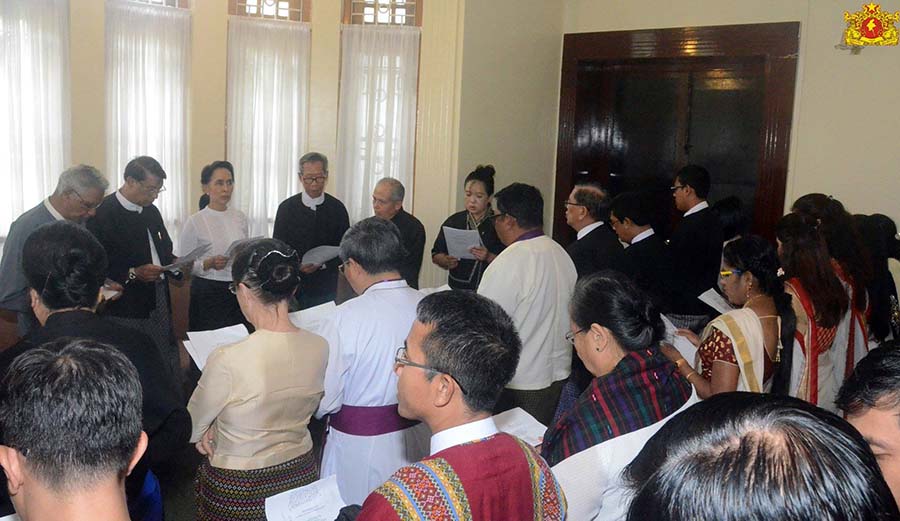YANGON — On July 19, Myanmar State Counselor Daw Aung San Suu Kyi opened the door of her lakeside villa in Yangon to a group of interfaith leaders, who were invited to pray for her late father, General Aung San.
The annual ritual was initiated by her late mother, Daw Khin Kyi, and has been held at Daw Aung San Suu Kyi’s residence since her release from house arrest in 2010.
On Thursday, more than a dozen representatives of the Hindu, Muslim, Jewish, Baha’i and Christian faiths gathered at her home to pray for her father, who was assassinated 71 years ago along with eight colleagues. Known in Myanmar as Martyrs’ Day, it is a national day of mourning. In the morning on the same day, Daw Aung San Suu Kyi, as a Buddhist, made offerings to monks on behalf of the martyrs. Even 30 years after her mother’s death, it is interesting that she keeps Daw Khin Kyi’s interfaith ritual alive.

Al Haj U Aye Lwin, Chief Convener for the Islamic Center of Myanmar, who joined the service as a Muslim leader, quoted the State Counselor as saying, “As a national leader, my dad never discriminated based on race or religion. Please pray for the betterment of our country, without racial or religious bias.”
It’s likely that she was referring to Gen Aung San’s message to the Karen Conference in 1945, in which he said: “Everyone has freedom of religion, and the state has to be neutral on the issue. No one may be discriminated against based on their gender, race or religion when it comes to seeking work.”
Sadly, more than seven decades after his death, his vision still seems a long way from being realized, as the nation experiences a wave of Buddhist nationalism and anti-Muslim sentiment.
As the State Counselor, his daughter is aware of the situation, of course. As a believer in the notion that diversity is a strength, she encourages people of different faiths to develop mutual understanding. Amid the rise in Buddhist nationalism across the country, she understands the fact that harmony and peace among followers of different religions is needed more than ever if the country is to move forward. That’s why Myanmar saw its first ever mass interfaith rallies across the country last year. The events drew thousands of people from the country’s major religions—Buddhism, Islam, Hinduism, and Christianity—with religious leaders appealing to people to stop blaming others for conflict and to help restore peace.
It is heartening to see that the country’s interfaith movement for peace and harmony has received the state’s blessing. And it’s a source of relief for followers of minority religions, who have been alarmed by the rise in Buddhist nationalism, to see the interfaith prayer service being held at Daw Aung San Suu Kyi’s home. The knowledge that the nation’s de facto leader is, unlike her predecessors, religiously tolerant, offers them some feeling of security at least.
For all her tolerance, the State Counselor’s administration has been tightening its grip on the nationalists since coming to power. This much-welcomed effort has seen more restrictions than ever placed on Buddhist nationalism, which saw its heyday under former President U Thein Sein’s Union Solidarity and Development Party-led government.
On the other hand, it seems that the government has been taking calculated measures to punish the nationalists in order to avoid public discontent or division among the Buddhist clergy.
Over the past three years, any time they have faced government restrictions, the nationalists have threatened action, usually without following through. Their small, unpopular and failed sit-ins in Yangon and Mandalay last year showed that rather than attracting public support, such actions earn it public condemnation for inflaming nationalism and anti-Muslim sentiment, and are seen as attempts to derail the government’s national reform process. At the same time, the public revulsion against the nationalists has earned praise from the government.
So, in the best interests of the country, the NLD-led government should no longer hesitate to wipe these groups out, as they are giving Buddhism a bad name and inflaming instability in the country. On the other hand, the government should embark on more interfaith engagements to build trust among followers of the various faiths. Only mutual respect and understanding can cure the phobia some people feel toward other religions. Most importantly, to make Myanmar religiously harmonious, there can be no room for faith-based nationalism.

















